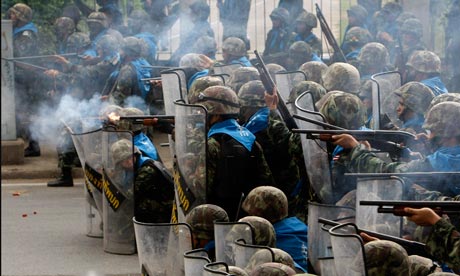
• Redshirt leader agrees to autumn dissolution of parliament
• PM to set peace conditions before possible November election
• PM to set peace conditions before possible November election
- guardian.co.uk, Tuesday 4 May 2010 18.14 BST
- Article history
Thai soldiers fire at redshirt protesters in Bangkok. Peace may return to the capital with the acceptance of the prime minister's 'reconciliation roadmap' to a general election in November. Photograph: Eric Gaillard/Reuters
The redshirt leadership agreed to a proposal from embattled Thai prime minister Abhisit Vejjajiva for a "reconciliation road map" that included the dissolution of parliament before a general election on 14 November.
The redshirts have been on the streets of the Thai capital since 12 March, calling for the resignation of the Abhisit government, which they regard as illegitimate, and in power on the back of the military.
Today, on the stage at their main protest site in the heart of Bangkok's shopping district, leader Veera Musikapong announced: "Redshirt leaders unanimously agree to join, and welcome, the reconciliation roadmap proposed by the prime minister to prevent further loss of life."
The prime minister made his offer on every channel on Thai TV yesterday evening, telling the nation: "I am confident we can bring back peace."
But the redshirts will not leave the streets of Bangkok yet, asking that the government clarify the details of its offer. Veera argued the election date was the bailiwick of the electoral commission, not the prime minister, and asked Abhisit to nominate a date when he would dissolve parliament.
Other key details are still to be thrashed out, including the caveats imposed by Abhisit, such as insisting that an election only be held "once the country is peaceful", and other vague but potentially draconian conditions, including that "the government will ensure that the media will function as a constructive tool".
There is widespread desire in the capital for the redshirts' protest to end as soon as possible.
Tomorrow is coronation day in Thailand, and were the redshirts to mark it by pulling down their tyre-and-bamboo barricades blocking Bangkok's streets it would be seen an act of good faith and of loyalty to the monarchy.
While the early election – Abhisit's term does not expire until the end of 2011 – will widely be seen as a victory for the redshirts, the timing of an election at the end of the year is a concession won by the government.
Both sides of Thailand's political divide want to be in power in September, for two critical events: the annual round of promotions in the military – a highly political body in Thailand – and the passing of the country's budget.
Both are taking credit for the breakthrough, but the passage of time has also played a part in ending the standoff.
As the sit-in has dragged on, the number of redshirt protesters behind the heavily fortified barricades has dwindled. From a peak of perhaps 100,000, there now remains a hardcore of a few thousand.
Most redshirts are rural Thais from the poorer north and north-east of the country, and many have had to return home for the rice-planting season. Others have been frightened away by government threats that troops would again use force to move them, after 25 people died when troops moved on protesters on 10 April.
An election is widely tipped to be won by the redshirt-aligned Puea Thai party, a successor of exiled former fugitive PM Thaksin Shinawatra's Thai Rak Thai party.
But even a "free and fair" election is not guaranteed to bring peace and stability. Professor of south-east Asian politics at the University of Leeds, Duncan McCargo, warned that should a redshirt-aligned government take power, the Abhisit-loyal, pro-monarchy yellowshirt supporters could be inspired on to the streets.
"Then, we're back to where we were because 30 to 40% of the population can't accept either result. You fear a return to the politics of 2008, which saw mass rallies, and the seizure of the airport and of Government House by yellowshirt protestors
No comments:
Post a Comment